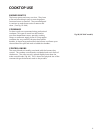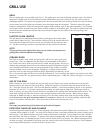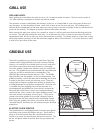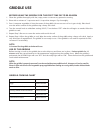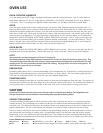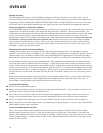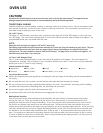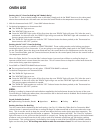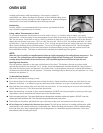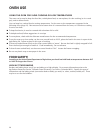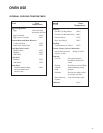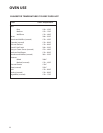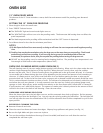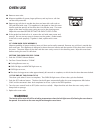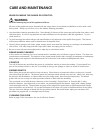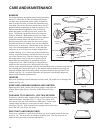
19
OVEN USE
cooking performance while maintaining a cool exterior surface for
comfortable use. When checking the doneness of food while broiling, leave
the door open only long enough to check temperature or determine degree
of doneness. Close door immediately after checking the food.
Preheating
For best results, it is recommended that the oven be pre-heated with the
door closed for approximately 10 minutes.
Using a Meat Thermometer to Broil
To accurately determine the doneness of a thick steak or chop (1-1/2 inches thick or more), use a meat
thermometer. Insert the point of the thermometer into the side of the meat to the center. Cook the first side to
90ºF for rare meat. Cook the first side to 100ºF for medium to well done. Cook the second side to the desired
degree for the doneness you want, 135ºF to 140ºF for rare, and 150ºF to 155ºF for medium and 160ºF to 165ºF
for well done. If you are cooking pork, cook to 170ºF. A large two-piece broil pan comes with your new range.
When you are broiling, always use both pieces. Do not cover the grid with aluminum foil. This slotted grid
allows the grease drippings to flow into the bottom of the pan keeping it away from the intense heat of the
infra-red broiler burner. This helps to minimize the smoking and spattering of the grease.
NOTE:
When the oven is used for an extended period of time at a high temperature, the cooling blower may turn on. This
is normal. The cooling blower will also operate during Broil and the Self-Cleaning cycle. If the blower is not
running during these modes, do not use the oven. Call a qualified appliance technician to repair the unit.
Broiling Rack Position
The rack position depends on the type and thickness of the food. Thick pieces of meat or poultry would
typically be broiled on rack position 2 or 3. Steaks, chops and hamburger would be broiled on rack position 4
(top rack) for thinner pieces and position 3 for thicker ones. If top browning casseroles or bread the thickness
of the food would indicate the rack position. Casseroles would typically be browned on rack position 2 or 3 and
bread on rack position 3.
To Get the Best Results
■ Defrost the food before starting to cook.
■ Set a minute timer for the minimum time to check the food. Steaks should be at least one inch thick if a rare
doneness is desired. It is difficult to get rare with meat that is thinner, or to get a nice brown piece of meat.
■ After half the total cooking time, turn the food over only once. It is not necessary to turn over thin foods (filet
of fish, ham slices, etc.) Liver slices must be turned over.
■ When top browning, use metal or glass-ceramic bakeware. DO NOT use heat-proof glass or pottery as this type
of glassware cannot withstand the intense heat of the broiler burner.
■
Use a two-piece broil pan. Two-piece broil pans are designed to minimize smoke and spatter. DO NOT cover the
slotted grid with aluminum foil. This will catch the grease and could cause a fire.
■ The broiler pan should be placed all the way to the back of the oven and centered on the oven rack.
■ All broiling must be done with the oven door closed. This will insure the best in cooking performance while
maintaining a cool exterior surface for comfortable use. When checking the doneness of food while broiling,
leave the door open only long enough to check temperature or determine degree of doneness. Close door
immediately after checking the food.
Fig. 13



